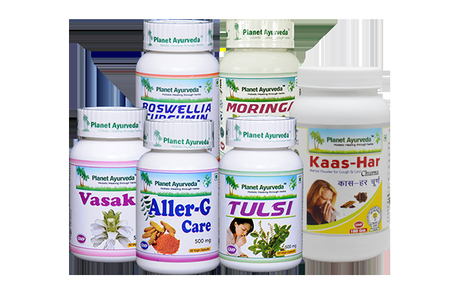Abstract
The lung diseases are common nowadays, due to continuously increasing air pollution, chronic smoking habits and bad eating routine and diet plans , making our body, particularly lungs, prone to many conditions. Moreover various packed food items and cold stored items that we consume, unseasonal food articles containing preservatives and other harmful chemicals are making overall health weak and prone for many diseases.
In Ayurveda, it is considered that the overexposure or overconsumption of these factors are leading to weakening of digestive fire, and reduced digestive fire is not able to process the food well that will create a condition of ama (endotoxins) formation, this ama is the root reason for the vitiation of tridosha and the basic cause for affecting the normal metabolism at cellular level, which leads to various auto-immune disease and connective tissue diseases. One of such diseases with an unknown etiology affecting lungs is non-specific interstitial pneumonia. In this article we are going to discuss this rare interstitial lung disease in detail & along with its best Ayurvedic treatment.

Introduction
Nonspecific interstitial pneumonia (NSIP) is the second most common type of idiopathic interstitial pneumonia following idiopathic pulmonary fibrosis. NSIP is a chronic interstitial lung disease which is having a homogeneous appearance of inflammation & interstitial fibrosis. Due to the lack of the characteristic histopathological features seen in other subtypes of idiopathic interstitial pneumonias, it is called a non-specific type. This condition usually affects the lungs bilaterally and may be presented with consioliditions or predispositions for the lower lobes of lungs.
In Ayurveda, this condition can be correlated with heen pita- madhya vata kapholavan sannipat jwar. The main part that this disease affects is phuphus (lungs). It is also termed as Shwashnak jawar by Acharya Madhav. According to Acharya Madhva

Madhava Nidana Parishisht)
The patient who regularly spits out reddish blood mixed sputum, having severe difficulty in breathing along with fever, and whose part of lungs become consolidated, that condition is known as Shawshank jwar.
Causes
Nonspecific interstitial pneumonia is mostly an idiopathic disease which means a disease of unknown etiology. But sometimes this disorder can be seen in association with connective tissue disease, toxins, HIV infection or various other causes. Some of the secondary causes of NSIP are as:
In Ayurveda, Acharya Madhav had given the nidana for the Shwasnak jwar. That can be considered as the risk factors for NSIP. These include

Madhava Nidana Parishisht)
The person who has proper exposure to cold climate due to lack of adequate wear, devoid of proper nourishing food, weak person, tired person, digestion issues, chronic alcoholic person, having inflammation in liver or kidney (i.e. person with kidney & liver disorders) or prolonged contact with the affected persons is in high risk zone of developing this disease. Furthermore, this disease can occur in any season, but the winters, spring and rainy season are the more prone seasons.
Sign & Symptoms
The clinical features of NSIP include manifestations due to gradual and chronic respiratory failure. These include:
These triad of symptoms are persistent and may be presented from months to years. Also the cough is mostly dry or non productive.
On examination an abnormal chest auscultation usually shows end inspiratory fine crackles in the base of both lungs.
NSIP pattern's characteristic feature include
- Uniform and diffuse inflammation on the low part of the alveolar wall,pleura and bronchovascular bundles.
- Absence of normal alveolar walls in affected lobules.
- Plasmacytic or lymphocytic infiltration
- Cellular or fibrotic changes along with loose fibrosis can be seen.
Ayurvedic View
Acharya Madhav had given particular symptoms for the Shawshank jawar which are as

Madhava Nidana Parishisht)
- Fever with chills
- Excessive thirst
- Anorexia
- Dyspnea
- Pain in ribs
- Chronic cough (mostly dry)
- Haemoptysis (blood mixed sputum)
- Increased rate of respiration
- Redness over cheeks
- Weakness
- Wheezing
- Sweating on forehead, small boils over body
- Coated tongue
- Increased pulse rate
- Depression
Also, Acharya had mentioned some updravas (complications) due to this condition that includes

Madhava Nidana Parishisht)
Diagnosis
- It is often difficult to make a diagnosis for non-specific interstitial pneumonia, since it includes several other diseases.
- Therefore, it is recommended to have two phases for the prepper diagnosis.
The first phase include multidisciplinary diagnosis for its causes (i.e. idiopathic, connective tissue, etc.) based on:
And then for confirmation the histological diagnosis of NSIP pattern is required.
Treatment
The basic treatment modality in modern medicine for nonspecific interstitial pneumonia is the use of oral corticosteroids such as prednisone, but if the corticosteroid therapy does not show effective results, they usually add immune suppressing drugs in addition to steroids. Both of these, in the long run, cause multi-system damage to the body and are full of side effects.
Ayurvedic management for Shwasnak jwara (Non-specific interstitial pneumonia) is decided on the basis of age and severity of the disease with herbal medicines, diet and lifestyle modifications.
Few lifestyle modifications indicated for the patient of NSIP are
- Patients must avoid all the nidan mentioned.
- Complete rest is advised to the patient, that too in a clean and fresh aired environment.
- The affected person is advised not to sleep over the more painful portion of the body and try to avoid any type of pressure on that part.
- Patients must wear warm clothes and the room of the person is kept warm in the cold climate.
- Diseased person must be isolated from childrens for further consequences.
- Warm massage must be done in the chest region, and patients must be fed with lite and easily digestible diets.
- In the early stages of the disease intermittent fasting (langhan) can be done to resolve ama condition.
- Pranayam (Breathing exercises) and yogasana:
The patient of interstitial pneumonia must do regular breathing exercises daily. Start with Khand pranayam slowly along with Kapalbhati pranayam. After mastering these two one could include other pranayam such as
- Bhastrika pranayam
- Nirvana pranayam
- Nadishodhan pranayam
- Bhramari pranayam
Planet Ayurveda is a Manufacturing Company That Hosts The Manufacturing Of Various Products That Are Purely Herbal In Origin And Are 100% Obtained From Natural Sources. These Herbal Formulations That Are Being Manufactured Here Are In The Strict Adherence To Ancient Ayurvedic Texts. These Products Are Made Under the Guidance and Opinions of Our Expert & Experienced Team of Ayurvedic Physicians by Ancient Time Tested Formulas.
Planet Ayurveda's experts' also suggested herbal formulation for the non-specific interstitial pneumonia in a combination form for the better results in the disease.
These include


Product Description
1. Vasaka Capsules
Vasaka capsules are the best herbal supplement for the lungs made from the standardised extract of Adhatoda vasica formulated in capsule form. The leaves of this herb contain many beneficial phytochemicals such as various alkaloids, phenolics and flavonoids in it. Vasicine (a quinazoline alkaloid) is the most potent and important. These phytochemicals play a key role in promoting the health of lungs along with decreasing the mucous formation in NSIP. This herb is known for its actions on respiratory ailment since ages, due to its tikta, kshay rasa (bitter, pungent taste), and katu vipak and sheet virya (cool potency), it is kapha pitta hara(reducing aggravated kapha and pitta dosha) in nature. As mentioned above this disease is kapholavan, which means due to excessive vitiation of kapha, kapha is the main dosha involved in the mucus formation. Thus, regular use of this medicine promotes the inhibition of mucus formation in the alveolus.
Dosage: 2 capsules twice daily, with plain water after meals.
2. Aller-G Care
Aller-G Care capsule is a poly herbal formulation that contains ingredients like shrish ( Albizia Lebbeck), neem ( Azadirachta indica) and ashwagandha ( Withania somnifera). It has anti-inflammatory and analgesic properties which help in relieving pains and heaviness in the chest region due to the ongoing interstitial pneumonia condition.
Dosage - 2 capsules two times a day with plain water after meals.
3. Tulsi Capsules
Tulsi capsules are the standardised extract of Ocimum sanctum prepared in the house of planet ayurveda. This formulation prevents the lungs from further infections and also strengthens the respiratory tract.
Dosage - 2 capsules twice daily with plain water after meals.
4. Kaas-Har Churna
The effective combination of herbs for lung and respiratory diseases made by Planet Ayurveda's expert on the classical reference of Sitopaladi churna. The ingredients include five amazing herbs having their unique actions i.e. mishri, vanshlochan, pippali, ela, and dalchini. In NSIP the ingredients such as mishri (shiny sweet little crystals) are for enhancing the taste and have medicinal properties that relieves irritation in cough along with an anti-inflammatory action. Vanshlochan (bamboo manna) is the second ingredient which has anti cough properties along with it aids in treating the affections of lungs.
Pippali ( Piper longum) is an amazing herb having expectorant properties (promotes the secretion of sputum) and also it is considered as yogvahi (immunomodulating). The next ingredient is ela ( Elettaria cardamomum) is a great expectorant and is very much beneficial in various respiratory symptoms such as dyspnea, cough etc. The last ingredient is dalchini ( Cinnamomum zeylanicum) has multiple properties including analgesic, antiseptic, astringent, germicide and stimulant properties that help in treating various cough & breathing related symptoms in Nonspecific interstitial pneumonia.
Dosage - 1 teaspoonful three times daily with honey, after meals .
5. Boswellia-Curcumin
The most effective formulation made by our experts for various painful inflammatory cases. These capsules are made from two basic ingredients, shallaki ( Boswellia serrata) and haridra (curcumin- Curcuma longa). In NSIP, the shallaki acts by its analgesic and anti-inflammatory properties, thus reducing pain and swelling in alveoli, pleura, and basement membranes whereas haridra promotes the faster healing of the condition. Also, the regular use of this combination prevents the further damage to lung parenchyma and other tissues in NSIP.
Dosage - 2 capsules twice daily, after meals with plain water.
6. Moringa Capsules
These capsules contain the extracts of Shigru (Moringa oleifera). This herb has vata-kapha shamak properties and is thus very much beneficial in NSIP. Also, moringa is a rich source of antioxidants, it prevents the body from numerous infective conditions by scavenging the free radicals. This drug is also mentioned in sednopag by acharyas which means that shigru facilitates sweating. Thus a wonderful drug for reducing fever in NSIP.
Dosage - 1 capsule twice daily after meals with water.
Conclusion
Modern medicine focuses on symptomatic treatment for NSIP along with the use of corticosteroids and immunosuppressants which in turn makes the body susceptible for various infections as these drugs reduce the body's ability to fight against antigen or pathogen. Whereas the treatment methods in Ayurveda include a holistic approach of herbal formulations along with healthy diet plans and lifestyle modifications. Thus, with Ayurveda there is better scope of treatment of these types of interstitial lung disease and that too by boosting the overall health of lungs and body's immunity rather than suppressing it.

